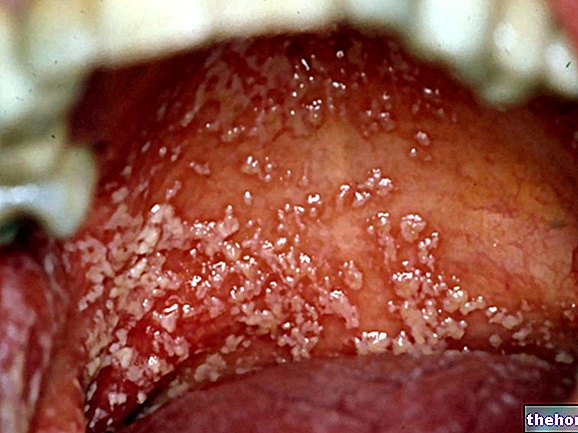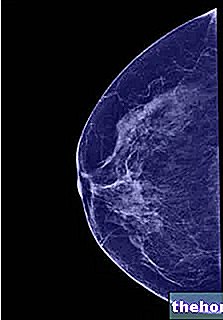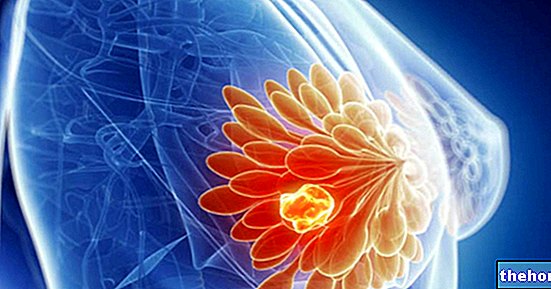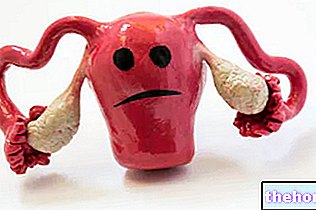By "dysfunctional causes of spotting" we mean all those etiological factors for which it is not always possible to accurately identify the disease or disorder directly related to abnormal uterine loss.
What is spotting?
Spotting outlines a condition that should never be underestimated: it is a very common phenomenon among adult women, consisting of unexpected brown-colored uterine discharge between one menstruation and the next.

In previous articles, we have dealt with the spotting disorder in general, and analyzed the organic causes that favor the disorder. In this discussion we will examine in detail the main functional (or rather dysfunctional) causes, which have the greatest impact on the manifestation of spotting.
Spotting is always an indicator that something in the body is not working properly: the abnormal uterine blood loss, typical of spotting, is not dangerous in itself, but the main problem is represented by the disorder that lies behind this phenomenon.
Dysfunctional causes
The identification of the main cause responsible for the spotting is essential for the correct diagnostic approach: in this regard, the exclusion of possible factors of organic origin (tumors, cysts, etc.) directs the doctor towards the most appropriate therapy for the patient.
The causes of a dysfunctional nature that cause spotting include:
- Stress (functional cause of hormonal modulations);
- Obesity, bulimia, anorexia and eating disorders in general;
- Crash diets, vitamin deficiencies;
- Diabetes, hypercholesterolemia;
- Sedentary lifestyle, smoking;
- Post-pubertal and premenopausal period;
- Inadequate insertion of the contraceptive spiral (the topic has already been extensively discussed in the "spotting" article);
Some dysfunctional etiological factors that affect spotting deserve a closer look: in the next paragraphs, stress, premature menopause and eating disorders will be treated scrupulously.
Stress and spotting
Distress (negative stress) is the main dysfunctional cause responsible for spotting; stress, in fact, could cause pathological implications of various entities.
In recent years, stress has been fueled by the frenetic pace of everyday life, to which most people are subjected due to daily commitments and the unstoppable, non-stop frantic rush of working life in general. it should not be minimized, because in women it could cause disturbances that are reflected in the (un) regularity of the menstrual cycle.
Stress causes dysfunctional spotting because it alters hormone production: it has been shown, in fact, how distress favors the excessive synthesis of adrenaline and cortisol. These hormones, when produced in abnormal quantities, cause a vicious circle in which the hypothalamus it is no longer able to manage and control visceral functions and biorhythms in general: it is therefore clear that the menstrual cycle also undergoes significant alterations, and the spotting depends precisely on the imbalance of hypothalamic impulses.
Insufficient - or lack of - control at the level of the hypothalamus could reduce the production of sex hormones - such as progesterone - essential for regulating the menstrual cycle: a possible consequence is given by spotting, which reflects a request for help from of the organism, a spy who should alert the woman from the very first symptoms. In these cases it is necessary the intervention of the doctor who, following a gynecological inspection, can direct the patient to the treatment most suitable for her (eg progestin therapy, which increases - and thus restores - the insufficient level of endogenous progesterone).
When the doctor frames the woman as "excessively stressed"From the diagnostic point of view, the patient should devote more time to herself, practice sports, movement, relaxation practices (eg yoga) and, if necessary, stop smoking: in this way, the hypothalamic harmony can be restored Consequently, the menstrual cycle also benefits from it and the woman can recover from spotting The woman who is "sick" from spotting must adopt a lifestyle appropriate to her body, capable of eradicating the stress that is at the basis of the disorder.
Stress »hormonal alteration» overproduction of cortisol and adrenaline »lack of hypothalamic control» decrease in progesterone »lack of menstrual regularization» spotting
Menopause and spotting
Another dysfunctional cause of spotting is menopause, a very delicate period for women, impregnated with radical physical, structural and psychological changes: the woman is aware that the boundary of fertility is about to be crossed, to reach an arid and sterile phase This awareness generates considerable stress for many mature women: stress, associated with the period of strong hormonal disturbance, could cause unpleasant situations, including spotting.
However, it certainly cannot be generalized by saying that all women approaching menopause are stressed, much less that all mature women beyond their fertile period suffer from spotting. Stress, like spotting, are factors that they might affecting women in this delicate phase, but the link stress - spotting - menopause does not always occur.
Therefore, regardless of the stress, the woman approaching menopause, and in particular women who enter premature (before 40 years of age) or premature (between 40 and 45 years of age) menopause, can be affected by spotting; in such situations the cause lies in the anomalous and irregular endogenous production of progestin and estrogenic hormones: the phases of growth and exfoliation of the endometrium are no longer regular, much less controlled, therefore the menstrual cycle becomes irregular and, sometimes, generates spotting because the woman's biorhythm goes in tilt.
Eating disorders and spotting
Eating disorders represent further dysfunctional causes that further burden the onset of spotting: drastic diets, anorexia, bulimia, overweight and obesity alter the physiological hypothalamic functioning, favoring spotting and other menstrual disorders.
Following the rules dictated by good nutrition education helps to prevent this kind of ailments: therefore, excesses and nutritional deficiencies must be avoided, as they represent a considerable danger for the organism.
Anorexia is a dysfunctional cause in which the voluntary deprivation of food and the refusal of it can cause spotting, failure to ovulate, oligomenorrhea and other menstrual disorders.
Spotting also afflicts many overweight women and the phenomenon is more marked in obese patients: dark uterine discharge between one menstruation and the next seems to be induced by the "excessive and unregulated growth of the endometrium, in turn caused by the" abnormal production of oestrone. , estrogen hormone whose synthesis is stimulated by adipose tissue.
Another dysfunctional cause of spotting is bulimia: the low amount of progesterone produced in bulimic women causes spotting. In fact, the glycemic fluctuations typical of bulimia, caused by the alternation of binge eating (excessive increase in blood glucose) and vomiting (which causes a significant decrease in blood sugar), weigh on the production of progesterone, which is increasingly reduced in terms of quantity and duration. Spotting therefore represents a typical disorder of bulimic patients, being a consequence of the abnormal and unregulated alternation of endometrial flaking / growth induced by the associated endocrine alterations.
Conclusions
Although spotting is a disorder that in itself is not serious, it must never be underestimated: in this regard, the patient must contact the gynecologist and undergo diagnostic tests to make sure that the spotting does not hide serious pathologies. Affected women should never self-diagnose the problem, because it is the doctor's job to ascertain it. It is clear that, when spotting is due to eating disorders, it is necessary to intervene primarily by treating the disease at its root: the healing of bulimia / anorexia / obesity also favors the treatment of secondary symptoms (spotting).
If the spotting is caused by more general dysfunctional causes, such as stress, the woman should try to listen to her body, dedicating more time to herself and her relaxation. Menstrual disorders in general, and spotting in particular, perfectly reflect the state of health of the woman, so stress certainly does not help the menstrual balance.
Summary
These are all those etiological factors for which it is not always possible to accurately identify the disease directly linked to the abnormal uterine loss
- Stress
- Eating disorders in general;
- Strict diets, vitamin deficiencies;
- Diabetes, hypercholesterolemia;
- Sedentary lifestyle, smoking;
- Post-pubertal and premenopausal period;
- Inadequate insertion of the contraceptive coil
Distress
Known as negative stress, it is the prevalent dysfunctional cause that causes spotting. Distress should not be underestimated because it could cause significant menstrual irregularities
It alters hormone production favoring the excessive synthesis of adrenaline and cortisol: following the overproduction of these hormones, the hypothalamus is no longer able to control the woman's biorhythms. Spotting is the first consequence.
With menopause, an abnormal and irregular endogenous production of progestin and estrogenic hormones could occur: when the growth and exfoliation phases of the endometrium are no longer regular, the onset of spotting is favored.
Voluntary deprivation of food and refusal of it can cause spotting and other menstrual disorders.
Spotting is induced by the excessive and unregulated growth of the endometrium, in turn caused by the abnormal production of estrone, an estrogen hormone whose production is stimulated by adipose tissue.
Bulimia is a "further dysfunctional cause of spotting, since the low amount of progesterone produced in bulimic women causes small, abnormal and unexpected uterine discharge.






















-nelle-carni-di-maiale.jpg)




